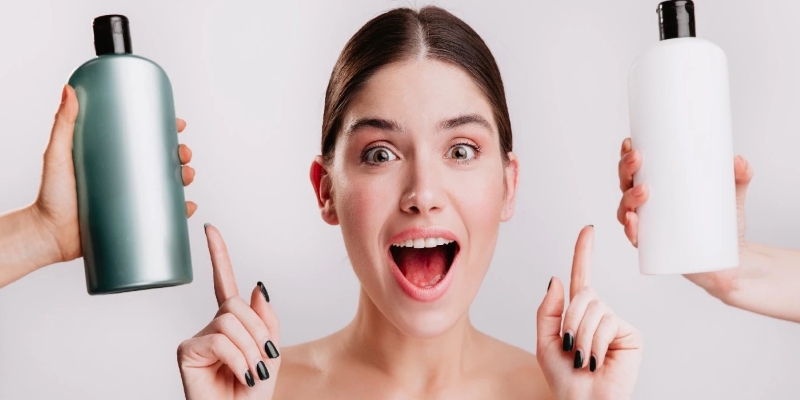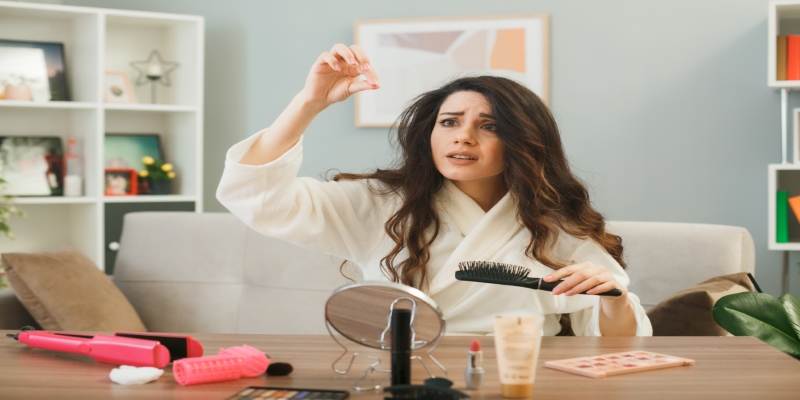Maintaining healthy hair can be a bit of a balancing act. One question that often arises is whether it's beneficial to switch shampoos regularly.

Let's delve into the pros and cons of changing shampoos frequently and how it can impact hair health.
The Benefits of Switching Shampoos
Switching shampoos periodically can offer several benefits for your hair and scalp, enhancing their overall health and appearance. Here's a closer look at these advantages.
Preventing Product Buildup
Using the same shampoo over time can lead to residue accumulation on your hair and scalp, resulting in dullness and potential clogging of hair follicles. Switching shampoos helps remove this buildup, restoring your hair's natural shine and volume.
Addressing Seasonal Needs
Different seasons bring different challenges. Summer's heat and humidity can make hair oilier, while winter's cold and indoor heating can cause dryness. By using clarifying shampoos in summer and moisturizing ones in winter, you can cater to these seasonal changes and keep your hair healthy year-round.
Experimenting with Different Formulations
Trying various shampoos allows you to discover the best products for your specific hair type and concerns. For example, you might find that argan oil is excellent for dry hair, while tea tree oil can help control dandruff.
Catering to Changing Hair Needs
Your hair's needs can change due to age, hormonal shifts, or lifestyle changes. Switching shampoos allows you to adapt your hair care routine accordingly. For instance, as hair becomes drier with age, more hydrating shampoos can maintain its health and vitality.
Enhancing Hair Health and Appearance

Different shampoos offer benefits like strengthening, volumizing, or smoothing. By rotating shampoos, you can take advantage of these benefits, leading to healthier and more attractive hair.
The Drawbacks of Frequent Shampoo Switching
While frequent shampoo switching has benefits, it can also present several drawbacks. Understanding these can help you make more informed decisions about your hair care routine.
Scalp Irritation and Allergic Reactions
Regularly introducing new ingredients can increase the risk of irritation or allergic reactions. People with sensitive skin or specific allergies are particularly vulnerable to these issues. This frequent exposure to different chemicals can lead to redness, itching, and discomfort.
Disruption of Scalp Microbiome
The scalp's microbiome plays a crucial role in maintaining scalp health. Constantly changing shampoos can disrupt this balance, leading to problems like dandruff, itching, or oil production imbalances. This disruption can make it challenging for your scalp to maintain its natural defenses.
Inconsistent Results
Each shampoo's unique formulation affects hair and scalp differently. Frequent changes prevent your hair and scalp from adjusting, leading to inconsistent results and making it hard to assess a shampoo's effectiveness. This inconsistency can result in dissatisfaction with your hair care routine.
Increased Sensitivity

Regular exposure to various ingredients can make your scalp more sensitive over time. As your scalp encounters new chemicals frequently, it might become more reactive, leading to increased sensitivity and a higher likelihood of adverse reactions.
Potential for Over-Treatment
Switching shampoos often might lead to using products that are not necessary for your hair's current condition. Overuse of certain shampoos, like clarifying ones, can remove natural oils from your hair, causing dryness and damage.
How to Decide When to Switch Shampoos
Deciding when to switch shampoos involves paying close attention to the signs your hair and scalp are giving you. Here are key indicators and considerations to help you make an informed decision.
Signs It's Time to Switch Shampoos
Scalp Irritation: If you experience persistent itching, redness, or discomfort, it could indicate that your current shampoo is too harsh or contains ingredients that your scalp doesn't tolerate well. Switching to a gentler formula can help alleviate these symptoms.
Excessive Dryness or Oiliness: Hair that feels excessively dry, brittle, or, conversely, overly greasy may be reacting to the shampoo you are using. Your shampoo might be stripped of too much natural oil or fail to cleanse effectively. Trying a moisturizing or clarifying shampoo, respectively, can help restore balance.
Lack of Volume and Shine: If your hair appears dull, flat, or lifeless, it might be a sign that the shampoo is not providing sufficient nourishment or is leaving residue. A switch to a volumizing or shine-enhancing shampoo might bring back the desired luster and bounce.
Product Buildup: Feeling a residue on your hair even after washing is a clear sign that your current shampoo is not effectively cleansing your hair. In this case, a clarifying shampoo can help remove the buildup and leave your hair feeling clean and fresh.
Change in Hair Condition: Life events such as pregnancy, hormonal changes, or significant changes in health can alter your hairs texture and needs. If you notice changes in your hair condition, it might be time to switch shampoos to better suit your new hair type.
How to Choose the Right Shampoo
When switching shampoos, consider the following tips to select the most suitable product:
Identify Your Hair Type: Understanding whether your hair is oily, dry, normal, fine, thick, or color-treated will help you choose the right shampoo. Each hair type has specific needs that different shampoos address.
Read the Ingredients: Look for ingredients that benefit your hair type and avoid those that might irritate. For example, sulfate-free shampoos are often recommended for color-treated hair because they are gentler and help maintain color.
Patch Test New Products: Before fully committing to a new shampoo, do a patch test to check for any adverse reactions. Apply a small amount to a section of your scalp and wait for 24 hours to ensure it doesn't irritate.
Consider Professional Advice: If you're uncertain about which shampoo to use, consult a hair care professional for personalized advice tailored to your unique hair and scalp needs.
Conclusion
Switching shampoos can be beneficial when done thoughtfully. Pay attention to signs like scalp irritation, dryness, oiliness, lack of volume, product buildup, seasonal changes, and hair condition. Choose shampoos by understanding your hair type, reading ingredients, patch testing, and seeking professional advice to maintain healthy, vibrant hair.

Top Hair Masks to Tame Frizzy Hair: Your Guide to Smoother, Shinier Locks
Jul 24, 2024

Is It True That Grapes Are Good For You?
Dec 25, 2023

Top Biotin Supplements for Healthier Hair in 2024
Jul 25, 2024

The 5-Move Stomach Workout You Can Do At Home To Build Core Strength
Oct 26, 2023

What You Need To Know About The 5k Training Plan
Nov 14, 2023

Unhealthy Foods For Fatigue
Feb 04, 2024

Preventing Eyelash Loss: Essential Tips for Healthier Lashes
Mar 12, 2024

How Many Calories Are In A Watermelon?
Oct 08, 2023



